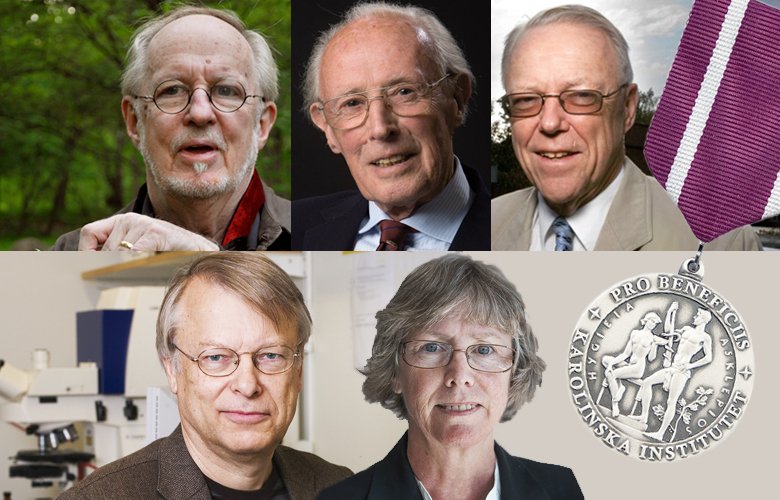Ove Hagelin, Richard J. Heald, Hans Jörnvall, Lars Olson and Nancy Pedersen awarded Karolinska Institutet’s Grand Silver Medal

Karolinska Institutet’s Grand Silver Medal 2020 is awarded to Ove Hagelin, Richard J. Heald, Hans Jörnvall, Lars Olson and Nancy Pedersen. The award has been conferred on them in special recognition of their significant contributions to medical research in general and Karolinska Institutet in particular.
Since 2010, Karolinska Institutet awards medals to individuals who have made special contributions to support KI’s activities. The 2020 Grand Silver Medal recipients have now been named:
Ove Hagelin, former Director of the Hagströmer Medico-Historical Library, Karolinska Institutet
Ove Hagelin is an undisputed world authority on older writings, particularly in the field of medicine and natural history. He is awarded the medal for saving and cataloguing priceless book collections through his efforts in founding the Hagströmer Library at KI.
During his time as director of the Hagströmer Library from its opening in 1997 until his retirement in 2013, Hagelin helped collect nearly 40,000 books, the majority of which were published before 1870. Hagelin’s discovery of the 17th century work De motu cordis by William Harvey at the Swedish Society of Medicine in 1986 triggered the chain of events that eventually led to the founding of the library.
Richard J. Heald, Professor, Basingstoke and North Hampshire Hospital, United Kingdom
Professor Richard J. Heald is awarded the Grand Silver Medal for introducing a new surgical method called Total Mesorectal Excision (TME), a surgical technique that has dramatically improved the prognosis of patients with rectal cancer. Heald, a surgeon specialised in colorectal cancer, has thus contributed to saving lives and reducing human suffering to an extent that few living surgeons have come close to.
Richard Heald has continued to develop TME and been heavily involved in teaching the method to colleagues, including at KI.
Hans Jörnvall, Professor, KI’s Department of Medical Biochemistry and Biophysics
Hans Jörnvall receives the medal for his outstanding contributions to Karolinska Institutet and to the field of protein analysis over decades. Jörnvall is a pioneer of this field – he early introduced new methods in Sweden and contributed to many other researchers’ success.
Jörnvall’s own research has focused on the primary structure—the order of amino acids—in protein. For many years, Hans Jörnvall has also played a central role in KI’s work with the Nobel Prize in Physiology or Medicine, as Secretary-General of the Nobel Assembly and Secretary of the Nobel Committee for Physiology or Medicine in the years 2000-2008.
Lars Olson, Professor, KI’s Department of Neuroscience
Lars Olson is awarded the medal for strong contributions, as a researcher and teacher in neurobiology for more than half a century, to Karolinska Institutet’s position as a world-leading university. His research has primarily concerned neurodegenerative diseases, in particular Parkinson’s, as well as memory, spinal cord injuries and Nogo nerve cell signalling, which is linked to the brain’s plasticity.
Lars Olson has also made significant contributions as an educator – in popular science lectures, articles, books and even theatrical performances and museum exhibitions. He is one of the founders of Hjärnfonden, the Swedish Brain Foundation, which distributes SEK 60 million annually for brain research.
Nancy Pedersen, Professor, KI’s Department of Medical Epidemiology and Biostatistics
Nancy Pedersen is awarded the Grand Silver Medal for her many years of work with the Swedish Twin Registry, which is now the largest of its kind in the world with information about more than 100,000 twins. Early on, Pedersen recognised the registry’s unique possibilities for studying the relative importance of genetic influences (heritability) and the environment.
Pedersen commenced a successful research career and laid the foundation for the reputation that the Swedish Twin Registry has today globally. Nancy Pedersen eventually became the director of the registry and is currently a member of its steering committee. Her research concerns for example how heritability and the environment affect personal characteristics, risk of medical and mental illness and aging.
